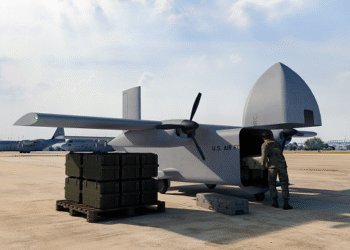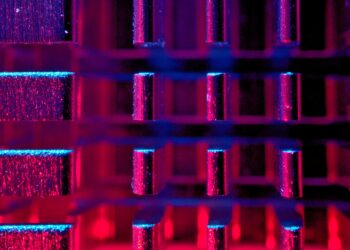Auterion — an early mover in open-source software to power drones — is today announcing a major equity round of $130 million (€110 million) as it picks up momentum in markets like Ukraine, where its tech is powering drone swarms on the battlefield in the war with Russia. Bessemer Venture Partners is leading Series B, one of the largest to date for companies focusing on drone operating systems. The investment values Auterion at ‘north of $600 million,’ a source close to the company told Resilience Media.
“The future of warfare is software-defined, unmanned, and at scale,” CEO Lorenz Meier said in a statement. “Auterion’s customers are taking the lessons from Ukraine and applying them to deploying drone swarms. Decisive advantage on the battlefield won’t be achieved by individual drones – it’ll be achieved by autonomous mass. This funding will allow us to provide Auterion’s AI-enabled swarming capabilities to democratic governments around the world who need to develop those capabilities at scale.” (Meier will be speaking out our event, Resilience Conference, next week. Get tickets here.)
The cash injection is coming amidst rising tides for defence technology. Shifting geopolitics, for example in Europe and Asia, have put military preparedness back on the agenda in many parts of the world after decades of relative peace, and many nations now are looking to update and expand legacy systems a part of their larger mission to build better overall resilience.
That has led to startups like Anduril and Helsing — which have leaned into the rise of artificial intelligence to produce autonomous air and sea drones powered by their own proprietary software — see their valuations soar into the tens of billions of dollars as they go head-to-head (but might sometimes partner) with the so-called primes that dominate the defence procurement market.
Alongside these, hundreds more startups are now emerging focusing specifically on defence use-cases, with hundreds more are positioning themselves as dual-use, providing options for enterprise/commercial purposes alongside military deployments. VCs that had previously eschewed funding defence are rising to the opportunity. They are now collectively investing billions of dollars to back and grow these startups.
This is Bessemer’s first defence tech/resilience investment in Europe, but it’s not likely to be the last, Alex Ferrara, the partner at Bessemer who led the deal, told Resilience Media in an interview today. (Previous backers Lakestar and Mosaic also participated in the Series B.)
“The war in Ukraine has demonstrated that advancements in AI combined with commercially available hardware has changed the nature and economics of warfare, enabling new defensive and offensive capabilities at lower cost,” said Ferrara.
That is where Auterion fits in. The startup originally came out of Zurich, Switzerland and raised its first money way back in 2018, a $10 million seed round from Lakestar, Mosaic Ventures, Costanoa Ventures, and Tectonic Ventures.
At that time, defence tech was not really a salient category in the world of startups, and it was not on Auterion’s immediate roadmap, either. Meier, who co-founded the company with Kevin Sartori (who is no longer at the company in an active role), was already well-known for being the creator of the most popular open source standards for the drone market — specifically PX4, Pixhawk, MavLink, and QGC.
Its mission at that time was to build open-source-based operating systems (and later controllers built on that software) for the fledgling commercial drone market. Its mission was largely around upending the dominant role that China’s DJI was taking (and still has). It hired multiple people from the latter firm in that effort.
In more recent years, the commercial drone market opportunity has become eclipsed by more pressing use cases in defence scenarios, where drone-based warfare has become a major vector for how forces formulate both their defence as well as their reconnaissance and offence. Three big themes have emerged around drone-based warfare, and Auterion — which is now headquartered in Arlington, with R&D in Munich and Zurich — has carved out a strong position in addressing them.
The first of these is a trend for more agile drone development, where components are assembled to deliver drones quicker, cheaper, and more advanced than those obtained through more traditional procurement channels.
Auterion’s software and controllers are very much a part of how those are being brought together by startups, larger companies, and forces themselves, with its systems in particular being designed to evade detection and jamming, part of the so-called “electronic warfare” front. A recent partnership with US-based navigation startup called Point One speaks to how Auterion is building the bridges for further integration and collaboration. (Notably, Auterion is also partnering with larger and more legacy players like Rheinmetall to build and integrate its tech.)
The second of these is a focus on “resilience” in the supply chain. Countries do not want to buy components or other parts from parties that can benefit their adversaries in any way. In that regard, a producer of an operating system out of allied markets like Auterion becomes very attractive.
The third of these is related to how drones are being used today. One of the biggest developments has been the rise of “swarms”, where large numbers of devices are working in concert with each other, and can be controlled accordingly. This is a key area where Auterion has focused its R&D and it appears to be the basis of a lot of its most recent business wins.











